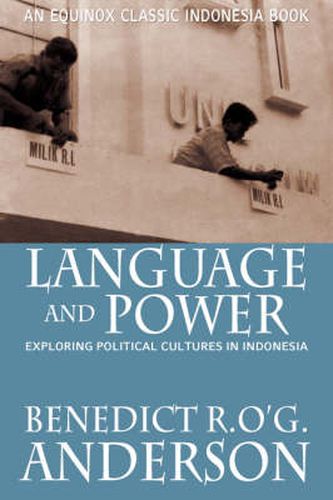Readings Newsletter
Become a Readings Member to make your shopping experience even easier.
Sign in or sign up for free!
You’re not far away from qualifying for FREE standard shipping within Australia
You’ve qualified for FREE standard shipping within Australia
The cart is loading…






This title is printed to order. This book may have been self-published. If so, we cannot guarantee the quality of the content. In the main most books will have gone through the editing process however some may not. We therefore suggest that you be aware of this before ordering this book. If in doubt check either the author or publisher’s details as we are unable to accept any returns unless they are faulty. Please contact us if you have any questions.
In this lively book, Benedict R. O'G. Anderson explores the cultural and political contradictions that have arisen from two critical facts in Indonesian history: that while the Indonesian nation is young, the Indonesian nation is ancient originating in the early seventeenth-century Dutch conquests; and that contemporary politics are conducted in a new language. Bahasa Indonesia, by peoples (especially the Javanese) whose cultures are rooted in medieval times. Analyzing a spectrum of examples from classical poetry to public monuments and cartoons, Anderson deepens our understanding of the interaction between modern and traditional notions of power, the mediation of power by language, and the development of national consciousness. Language and Power, now republished as part of Equinox Publishing’s Classic Indonesia series, brings together eight of Anderson’s most influential essays over the past two decades and is essential reading for anyone studying the Indonesian country, people or language. Benedict Anderson is one of the world’s leading authorities on Southeast Asian nationalism and particularly on Indonesia. He is Professor of International Studies and Director of the Modern Indonesia Project at Cornell University, New York. His other works include Imagined Communities: Reflections on the Origin and Spread of Nationalism and The Spectre of Comparisons: Nationalism, Southeast Asia, and the World.
$9.00 standard shipping within Australia
FREE standard shipping within Australia for orders over $100.00
Express & International shipping calculated at checkout
This title is printed to order. This book may have been self-published. If so, we cannot guarantee the quality of the content. In the main most books will have gone through the editing process however some may not. We therefore suggest that you be aware of this before ordering this book. If in doubt check either the author or publisher’s details as we are unable to accept any returns unless they are faulty. Please contact us if you have any questions.
In this lively book, Benedict R. O'G. Anderson explores the cultural and political contradictions that have arisen from two critical facts in Indonesian history: that while the Indonesian nation is young, the Indonesian nation is ancient originating in the early seventeenth-century Dutch conquests; and that contemporary politics are conducted in a new language. Bahasa Indonesia, by peoples (especially the Javanese) whose cultures are rooted in medieval times. Analyzing a spectrum of examples from classical poetry to public monuments and cartoons, Anderson deepens our understanding of the interaction between modern and traditional notions of power, the mediation of power by language, and the development of national consciousness. Language and Power, now republished as part of Equinox Publishing’s Classic Indonesia series, brings together eight of Anderson’s most influential essays over the past two decades and is essential reading for anyone studying the Indonesian country, people or language. Benedict Anderson is one of the world’s leading authorities on Southeast Asian nationalism and particularly on Indonesia. He is Professor of International Studies and Director of the Modern Indonesia Project at Cornell University, New York. His other works include Imagined Communities: Reflections on the Origin and Spread of Nationalism and The Spectre of Comparisons: Nationalism, Southeast Asia, and the World.